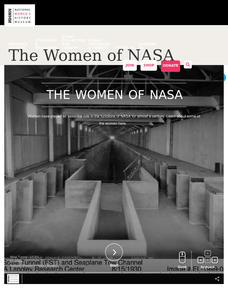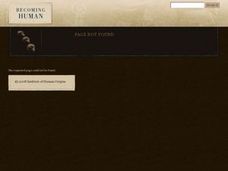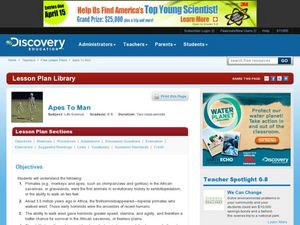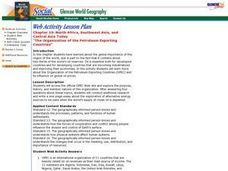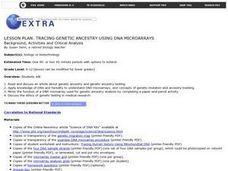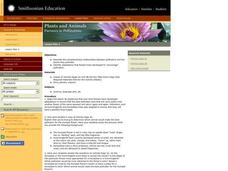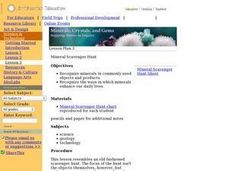National Woman's History Museum
The Women of NASA
Human computers? Although it may sound like science fiction, the term was used to describe the women who made the NASA calculations before the advent of electronic computers. A 21-slide presentation introduces viewers to the women who...
American Institute of Physics
When Computers Wore Skirts: Katherine Johnson, Christine Darden, and the “West Computers”
Did you know that people, known as computers, performed the complex calculations that are now done by electronic computers? Three of these human computers, Katherine Johnson, Christine Darden, and Melba Roy Mouton are featured in a...
Curated OER
"ART ZOO 'Blacks in the Westward Movement', 'What Can You Do with a Portrait', and 'Of Beetles, Worms, and Leaves of Grass'"
Students study black history, examine portraits and portrait making and create their own portraits, and investigate their natural environment. This humanities lesson provides a text that can be used to teach lessons in black history,...
Howard Hughes Medical Institute
Lesson 2: Gorongosa National Park
How has Gorongosa National Park changed over time? Discover the park's rich history, dating back to primitive human times, through an interactive timeline and scientific reading. The second installment in an eight-part series explores...
Curated OER
A Brief History of Life: How Did Everything Begin?
Addressing the idea of intelligent design, as well as a number of creation myths, this presentation gives a measured and scientific perspective to the beginning of the world. It includes a graphic on the Big Bang Theory, evolution, and...
Howard Hughes Medical Institute
Got Lactase? The Co-Evolution of Genes and Culture
Does the human body evolve as quickly as human culture? With a stellar 15-minute video, explore the trait of lactose intolerance. Only about 1/3 of human adults seem to still have the enzyme lactase and therefore, the ability to digest...
Curated OER
The African and the Pequot in Colonial America
Learners determine that the lands the English settled on were owned and inhabited by 70,000 Indians. They consider that the London Company sold land charters to the English, which gave them illegal title to lndian land and that the...
National Center for Case Study Teaching in Science
Bad Blood
When it comes to science and medicine, ethics should always be a primary consideration; unfortunately, that has not always been the case. There are countless examples throughout history of questionable medical practices, marginalized...
Curated OER
Internet Fact Hunt at the "Fact Monster" Web Site- May #4
In this Internet fact hunt activity, students access the "Fact Monster" web site to answer 5 multiple choice questions. They answer US history, science, literature, and geography questions.
Curated OER
Geography: African Floor Maps
Learners explore the African continent and identify the various countries there. They examine the history, geography, environment, and inhabitants of the countries. Students create maps of Africa using a variety of materials.
Curated OER
Building Bodies
Young scholars identify key anatomical similarities and differences between great apes and humans. They infer likely anatomical features in ancient human ancestors and list principal anatomical changes in primates necessary for...
Curated OER
Commonalities and Differences from Africa to Cleveland as Evidence Through the Gullah Community Connection
Students explore Afro-American history. They identify the commonality between African, Carolinian and Cleveland Black culture. Students explore the water cycle, oceanography, hydrology and bio-geochemical processes. They discuss the...
Curated OER
Reaching Across Borders In Southern Africa
Young scholars gain a greater understanding of how political borders impact human and environmental development. Then, either individually or as a class, establish a correspondence with a Peace Corps volunteer working in Africa.
Curated OER
Fossils Footprints Across Time
Learners examine fossils to understand how they are formed and how they give information about geological history. In this fossil instructional activity, students research and write about fossils and make models of different fossil...
Curated OER
Apes To Man
Students study primates and their evolution history. In this role play lesson students view a video on evolution then demonstrate how primates walked and other observations they noticed in the film.
Curated OER
Climate and Cultures of Africa
Students gain an understanding of the relationship between climate and culture in the sub- Saharan Africa. Students will complete short exercises pertaining to the various cultures of Africa and the climate in which they live....
Curated OER
Dinosaurs Were Real!
Students investigate the history of dinosaurs, as real animals. In this dinosaur lesson plan, students examine basic concepts that help them understand the history of all life. Included in this article is information on the world of the...
Curated OER
The Organization of the Petroleum Exporting Countries
Students investigate the global importance of the African and Asian countries that export petroleum. They access the OPEC website and research this organization. They answer questions and write an essay about alternative energy sources.
Curated OER
Goobers. Goobers? Goobers!
Students begin the lesson by noting the many ways in which to use peanuts. In groups, they use the internet to research the work of George Washington Carver. They discover the allergies and nutritional information of the peanut and...
Curated OER
Tracing Genetic Ancestry Using DNA Microarrays
High school learners read and discuss an article about genetic ancestry and genetic ancestry testing. They complete a paper and pencil activity that mimics the function of a DNA microarray and consider the ethics of genetic testing in...
Smithsonian Institution
Watching Crystals Grow
Amazing science can sometimes happen right before your eyes! The class gets cozy as they watch crystals grow. They use Epsom salts, rocks, and food coloring to create crystals. They'll observe the entire process, documenting every step...
Curated OER
Plants and Animals: Partners in Pollination
Students describe the complementary relationships between pollinators and the plants they pollinate, identify adaptations that flowers have developed to "encourage" pollination, and create and draw their own "designer" flowers.
Curated OER
Mineral Scavenger Hunt
Students complete a scavenger hunt worksheet as they find examples in their classroom, at home, etc., of minerals. Excellent worksheet!
Curated OER
Create a Classroom Exhibit: Rocks and Minerals
Students bring in rocks and minerals from home. They observe them and describe them carefully, completing a worksheet. Finally, a classroom exhibit is created.


